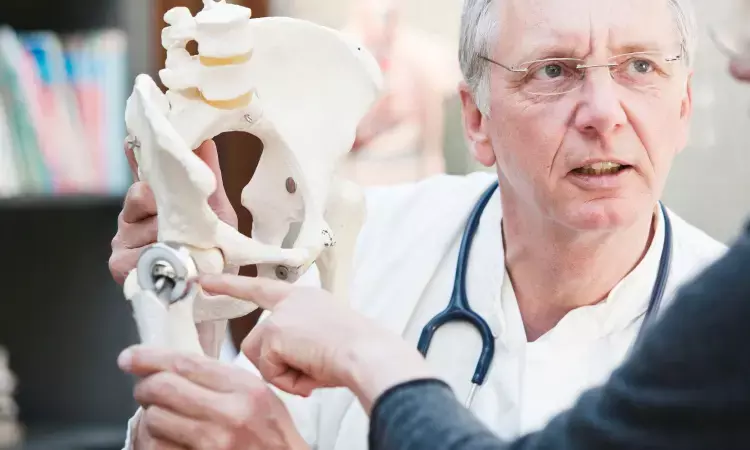- Home
- Medical news & Guidelines
- Anesthesiology
- Cardiology and CTVS
- Critical Care
- Dentistry
- Dermatology
- Diabetes and Endocrinology
- ENT
- Gastroenterology
- Medicine
- Nephrology
- Neurology
- Obstretics-Gynaecology
- Oncology
- Ophthalmology
- Orthopaedics
- Pediatrics-Neonatology
- Psychiatry
- Pulmonology
- Radiology
- Surgery
- Urology
- Laboratory Medicine
- Diet
- Nursing
- Paramedical
- Physiotherapy
- Health news
- Fact Check
- Bone Health Fact Check
- Brain Health Fact Check
- Cancer Related Fact Check
- Child Care Fact Check
- Dental and oral health fact check
- Diabetes and metabolic health fact check
- Diet and Nutrition Fact Check
- Eye and ENT Care Fact Check
- Fitness fact check
- Gut health fact check
- Heart health fact check
- Kidney health fact check
- Medical education fact check
- Men's health fact check
- Respiratory fact check
- Skin and hair care fact check
- Vaccine and Immunization fact check
- Women's health fact check
- AYUSH
- State News
- Andaman and Nicobar Islands
- Andhra Pradesh
- Arunachal Pradesh
- Assam
- Bihar
- Chandigarh
- Chattisgarh
- Dadra and Nagar Haveli
- Daman and Diu
- Delhi
- Goa
- Gujarat
- Haryana
- Himachal Pradesh
- Jammu & Kashmir
- Jharkhand
- Karnataka
- Kerala
- Ladakh
- Lakshadweep
- Madhya Pradesh
- Maharashtra
- Manipur
- Meghalaya
- Mizoram
- Nagaland
- Odisha
- Puducherry
- Punjab
- Rajasthan
- Sikkim
- Tamil Nadu
- Telangana
- Tripura
- Uttar Pradesh
- Uttrakhand
- West Bengal
- Medical Education
- Industry
Topical tranexamic acid tied to reduced opioid consumption after Total hip arthroplasty

China: A study entitled "Topical use of tranexamic acid can reduce opioid consumption compared with intravenous use for patients undergoing primary total hip arthroplasty: a prospective randomized controlled trial" By Lei Shen et al. published in BMC Musculoskeletal Disorders has concluded that using Tranexamic acid or TXA topically relieve the local pain symptoms and reduce opioid consumption than intravenous use for patients undergoing primary total hip arthroplasty or THA by reducing the early postoperative inflammatory response.
Explaining the study background, researchers said following THA, the most common concern is the problem of opioid addiction. Tranexamic acid has been shown to reduce blood loss in patients undergoing THA effectively. Only a few studies are focussing on its alleviation of postoperative local pain symptoms.
In the present study, researchers investigated whether topical TXA could reduce early postoperative hip pain for primary THA patients, thereby reducing the use of opioids and whether local pain is related to an inflammatory response.
They conducted a prospective randomized controlled study.
The important study points are:
- There were 161 patients divided into two groups: topical group and intravenous group.
- The topical group had 79 patients, and the intravenous group had 82 patients.
- VAS or visual analogue scale assessed hip pain within three days after surgery.
- Tramadol was used for pain relief when necessary.
- Hematologic tests were used to assess Inflammatory markers like high-sensitivity C-reactive protein (CRP), erythrocyte sedimentation rate (ESR), interleukin-6 (IL-6), total blood loss and haemoglobin drop.
- The primary outcomes measured were the VAS score and tramadol dose from the first to the third day after surgery.
- The secondary outcomes measured were the Inflammatory markers level, total blood loss and complications.
Explaining study results, they said pain score and inflammation markers level on the first day in the topical TXA group (2 g of TXA mixed in 50 ml normal saline injected in the drainage tube after closing the incision, keeping it closed for three h ) were lower compared to intravenous TXA group. The VAS score on the first day after surgery had a positive correlation with the inflammation markers. The dose of tramadol was lower compared to the intravenous group on the first and second days after surgery.
No differences were reported in total blood loss between the two groups and incidence of complications, they said.
The study's strength includes prospective randomized controlled trials and comprehensive assessments.
Further reading:
https://bmcmusculoskeletdisord.biomedcentral.com/articles/10.1186/s12891-023-06576-7
BDS, MDS in Periodontics and Implantology
Dr. Aditi Yadav is a BDS, MDS in Periodontics and Implantology. She has a clinical experience of 5 years as a laser dental surgeon. She also has a Diploma in clinical research and pharmacovigilance and is a Certified data scientist. She is currently working as a content developer in e-health services. Dr. Yadav has a keen interest in Medical Journalism and is actively involved in Medical Research writing.
Dr Kamal Kant Kohli-MBBS, DTCD- a chest specialist with more than 30 years of practice and a flair for writing clinical articles, Dr Kamal Kant Kohli joined Medical Dialogues as a Chief Editor of Medical News. Besides writing articles, as an editor, he proofreads and verifies all the medical content published on Medical Dialogues including those coming from journals, studies,medical conferences,guidelines etc. Email: drkohli@medicaldialogues.in. Contact no. 011-43720751


